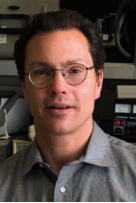Dynamic Response of the Environment At the Moon
 |
Bill Farrell
1. What is your role on the DREAM team?
Principal Investigator - I orient the DREAM work effort in a coherent direction defined by the project objectives and distribute funds to the various institutions participating in the project.
2. What about DREAM do you find most interesting? Most challenging?
The interaction between the plasma, the neutral atmosphere, and the surface is most interesting and challenging. We are finding that the Moon may have a reactive surface chemistry nature to it that is stimulated by the plasma.... we are just getting there on this, but may explain lots of unusual features like the emission of hot sodium from the surface and water molecules collecting surfaces exposed to the harsh space environment. The most challenging aspect will be forming and running the super-models, where now-separate models work together in parallel to understand the environment.
3. What other NASA programs or missions have you participated in?
In a Space Shuttle Spacelab mission, Voyager mission to the outer planets, Dynamics Explorer-1 to study the Earth's aurora, Hawkeye-1 that examined the Earth's polar magnetosphere, Wind spacecraft to study the solar wind, Cassini mission to Saturn, ESA's Mars Express, 4 rocket flights, 2 balloon missions, an Uninhabited Aerial Vehicle (UAV) lightning mission and a pair of Air Force missions. Some of these the projects we perform science analysis of the data obtain during the mission but for others we provide flight hardware such as electric and magnetic antenna/receiver systems.
4. What kind/level of education do you have?
Ph. D. from the University of Iowa in 1987.
5. What advice do you have for students who want to work for NASA or on NASA-related research?
I can't even begin to describe the fun we have! I have been to the desert to study the electrical properties of dust devils (we drive into the mini-tornadoes) and to Florida to fly unmanned drones over thunderstorms. I was very lucky to participate in the Voyager Neptune encounter - a very exciting time- in the late 1980's! And also the lab team provided instruments that flew on rockets into the aurora (northern lights) out of remote regions in Norway. My advice is get a good solid foundation in math, chemistry, and physics, and then keep looking at topic areas around your interest. Expand that limit....you will often find new ideas and applications by looking 'across' at other subjects and applying them to your studies/work.
6. What are your favorite things to do outside of work?
My hobbies are running, pastels, and watching Iowa football!

